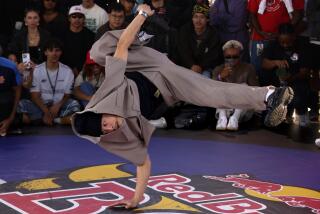A LOOK AT THE OTHER SPORTS...
- Share via
A year after their most glorious and glamorous of hours, United States wrestlers have returned whence they came. To obscurity.
They won nine gold medals in their Olympic fortnight--seven by the freestyle team--and shared the red, white and blue frenzy that swept the nation. They were not always prime-time players on television, nor front page figures in the newspapers, but they had their moments and made their headlines.
But in the aftermath of those Olympics, the guys who sweated for years for a little chunk of gold have slipped back into anonymity beyond the worlds of freestyle or Greco-Roman wrestling.
Bruce Baumgartner, for example, had a little taste of glory when he won the Olympic super-heavyweight freestyle gold medal last summer at the Anaheim Convention Center. He took a job as an assistant coach at Edinboro (Pa.) State College, but continued to compete.
When it came time for the 1985 USA Wrestling Freestyle Championships, Baumgartner’s in-laws were excited about watching him defend a title on which he has had a literal and figurative stranglehold of late. And the event was scheduled for Lock Haven (Pa.) State College.
“Lock Haven,” Baumgartner said, “is one of the hotbeds of wrestling, but the crowds were absolutely terrible. We had a few Olympians and a couple of Olympic alternates, so Linda’s parents figured tickets would be hard to get. We had wives, girlfriends and a few die-hard fans.”
Jeff Blatnick, the emotional winner of the Greco-Roman super-heavyweight championship, seemingly enjoyed the only post-Olympic notoriety among wrestlers--and even made one or two commercials.
“But,” Baumgartner said, “none of us in wrestling really made it big. Nothing like Mary Lou Retton. I wish just one of us had made it big, just to help the sport.”
Whereas Mary Lou ended up with her face on cereal boxes, wrestling’s heroes disappeared so completely they may as well have had their pictures on milk cartons or grocery bags.
Ironically, the same wrestlers enjoyed some of their greatest international successes after the Olympics ended--except no one was paying any attention.
In the 1985 Japanese Super Championships, an event that included 1984 Olympic champions and 1983 World Champions as well as a Japanese team, the U.S. freestyle team took four gold medals and three silver medals in seven events. And the Soviet Union was there.
Olympic gold medal winners Dave Schultz, Mark Schultz and Baumgartner and Olympic alternate Bill Scherr won gold medals and Andy Rein, Gene Mills and Dan Severn won silver medals. The Soviets won four gold medals, two silver medals and a bronze.
“Unofficially,” said Greg Strobel, national teams director, “we beat the Soviets.”
In the 1985 Freestyle World Cup competition, the U.S. did not fare quite as well against the Soviets. Dave Schultz, Baumgartner and Randy Willingham were the only winners in the 10 events.
The U.S. Greco-Roman team, which hadn’t been invited to World Cup competition since 1982, came up with a third-place finish behind the Soviet Union and Finland. It represented a giant step for Greco-Roman, the lesser-known of two little-followed U.S. sports.
What’s more, in the Japanese Super Championships, Jim Martinez won a gold medal and Greg Gibson and Steve Fraser won silvers.
“Our biggest change has been in Greco-Roman,” Strobel said. “We have come to expect freestyle to do well, but guys like Fraser, Gibson and Martinez have all done well for us in Greco-Roman.”
Domestically, little has changed in the world of wrestling. Iowa, coached by Dan Gable, Olympic freestyle coach, won its eighth straight NCAA championship. And Randy Lewis, an Olympic gold medalist, won his third straight individual championship.
Neither Olympic wrestling head coach, Gable or Greco-Roman’s Ron Finley, have been involved internationally this year.
“The year after the Olympics is always a quiet year,” Gable said. “I’ve been doing some work around the house. I’ve put in a pool in the backyard. I think the time we spent in California last summer kind of spoiled the family.”
All in all, amateur wrestling doesn’t seem to be a show unless the flags are flying, as they were when it became a very big show for those two weeks in the summer of 1984.
More to Read
Go beyond the scoreboard
Get the latest on L.A.'s teams in the daily Sports Report newsletter.
You may occasionally receive promotional content from the Los Angeles Times.






